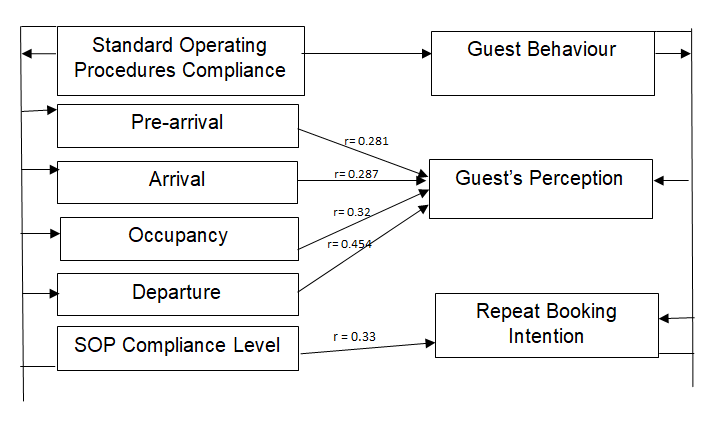Post Covid-19 Standard Operating Procedures’ Compliance and Guests’ Percetion in Hotels in Edo and Delta States, Nigeria
Main Article Content
Keywords
COVID-19 pandemic, Employees compliance, Guests’ perception;, Re-booking intention;, Standard operating procedures
Abstract
The main objective of this study was to examine how compliance with the post COVID-19 standard operating procedures (SOP) impacts on guests’ perception of cleanliness, hygiene and safety and their re-booking intention in hotels within Edo and Delta states of Nigeria. The study further investigated how each of the four stages in the guests’ cycle (pre-arrival, arrival, occupancy and departure) influences guests’ perception. Four specific objectives and corresponding hypotheses were formulated to guide the study. The target populations were the employees and guests of the hotels under study. To gather primary data, a four-point Likert-type questionnaire was used. Univariate data analysis was conducted using descriptive statistics (mean and standard deviation). The stated hypotheses were tested using Pearson Product Moment correlation technique. Results of the analyses revealed that there was positive and significant relationship between the extent of employees’ compliance with the SOP and guests’ perception and their re-booking intention. It was also observed that there was positive and significant relationship between each of the four stages of the guests’ cycle and guests’ perception, leading to the rejection of all the four hypotheses stated. Results indicated that extent of employees’ compliance with the SOP was moderate, while the level of guests’ perception was also moderate. The study revealed varied levels of compliance among hotels and assessed attributes. Based on the results obtained, the researcher concluded that compliance level influences guests’ perception and re-booking intention. Among other recommendations, the researcher recommended that Nigerian hotels should adopt and rigorously implement protocols for cleaning, hygiene, and safety measures, and follow the guidelines provided by health authorities and industry experts.
